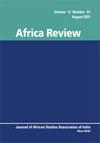Assessment of university students’ level of financial literacy: the voices of the National University of Development Studies education students
IF 0.5
Q4 AREA STUDIES
引用次数: 1
Abstract
ABSTRACT The study on which this article is based, intended to assess the level of financial literacy among the Government of Lesotho sponsored university students studying at the National University of Lesotho. The study was carried out during the academic year 2016/17. The objectives of the study were; first, to determine Development Studies education students’ level of financial literacy. Second, to identify if there is a change in Development Studies students’ attitude and behaviour towards handling National Manpower Development Secretariat financial support. Last, to identify strategies that could help students improve knowledge and skills in handling finances. The study adopted both a quantitative and qualitative approaches. It is a qualitative approach because it provided participants responses non-statistically, while quantitative approach descriptive statistics, frequency counts and percentages in order to hear the voices of the student teachers on how they handle their finances. A financial literacy survey questionnaire of four parts was developed to collect data from Development Studies education students/student teachers in the third year of study. The survey questionnaire was self – administered to a purposefully sampled group of 60 students. Data was analysed with the use of descriptive statistics, frequency counts and inclusion of participants’ verbatim excerpts. The study revealed that student teachers lack financial literacy. It concludes with the recommendation that student teachers require financial education that can assist them to understand the use of money.大学生金融素养水平评估:国家发展研究大学学生教育的声音
本文所依据的研究旨在评估在莱索托国立大学学习的莱索托政府资助的大学生的金融素养水平。该研究在2016/17学年进行。研究的目的是:第一,确定发展学教育学生的金融素养水平。第二,确定发展研究学生对处理国家人力发展秘书处财政支持的态度和行为是否有变化。最后,确定可以帮助学生提高理财知识和技能的策略。这项研究采用了定量和定性两种方法。这是一种定性方法,因为它提供了参与者的非统计反应,而定量方法是描述性统计,频率计数和百分比,以便听到学生教师关于他们如何处理财务的声音。本研究编制了一份由四部分组成的金融素养调查问卷,收集发展研究教育三年级学生/实习教师的数据。调查问卷是针对60名学生进行自我管理的抽样调查。使用描述性统计、频率计数和纳入参与者的逐字摘录来分析数据。研究发现,实习教师缺乏财务知识。它的结论是,建议学生教师需要金融教育,可以帮助他们了解金钱的使用。
本文章由计算机程序翻译,如有差异,请以英文原文为准。
求助全文
约1分钟内获得全文
求助全文
来源期刊

Africa Review
AREA STUDIES-
CiteScore
1.80
自引率
12.50%
发文量
22
期刊介绍:
Africa Review is an interdisciplinary academic journal of the African Studies Association of India (ASA India) and focuses on theoretical, historical, literary and developmental enquiries related to African affairs. The central aim of the journal is to promote a scholarly understanding of developments and change in Africa, publishing both original scholarship on developments in individual countries as well as comparative analyses examining the wider region. The journal serves the full spectrum of social science disciplinary communities, including anthropology, archaeology, history, law, sociology, demography, development studies, economics, education, gender studies, industrial relations, literature, politics and urban studies.
 求助内容:
求助内容: 应助结果提醒方式:
应助结果提醒方式:


